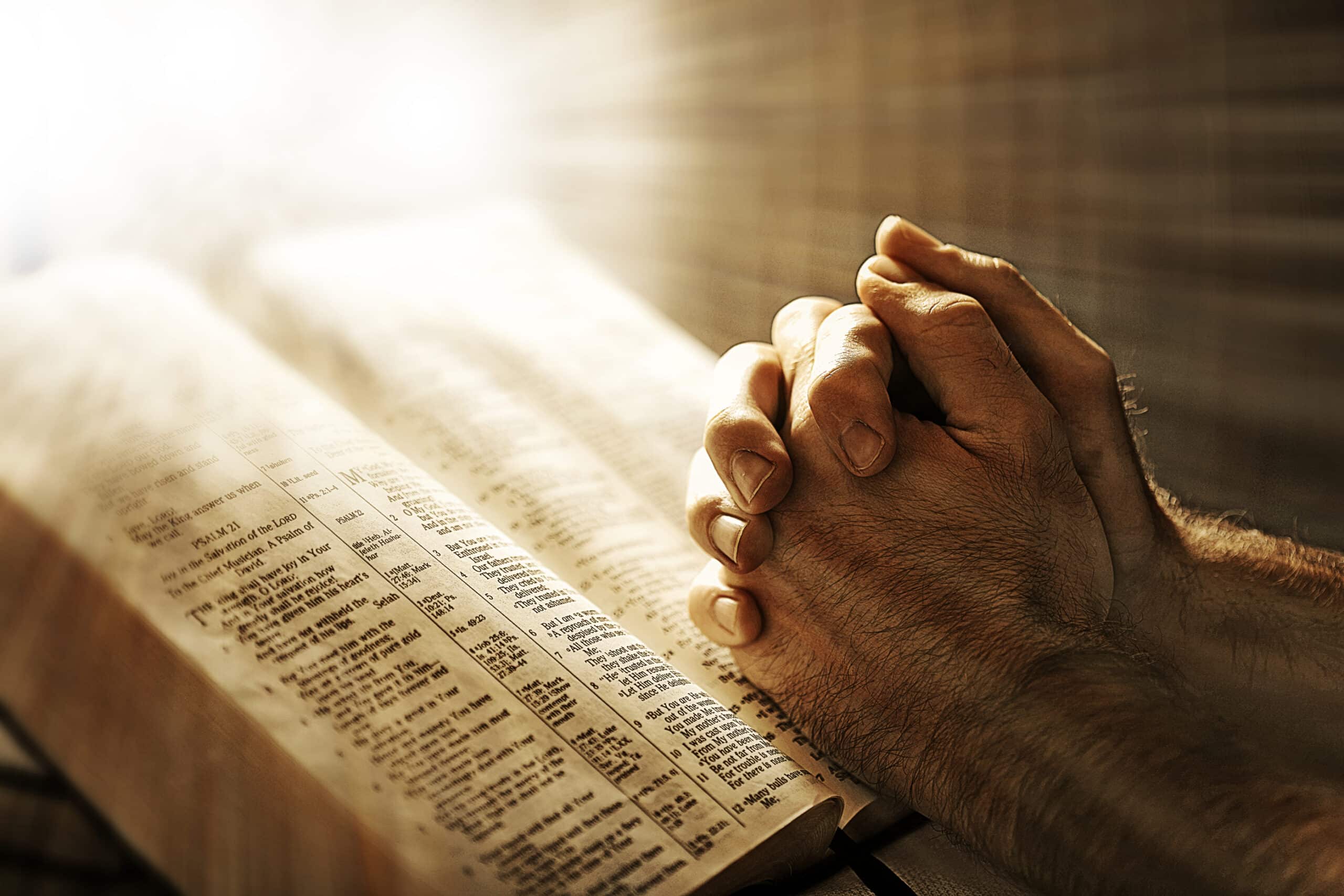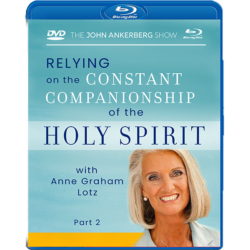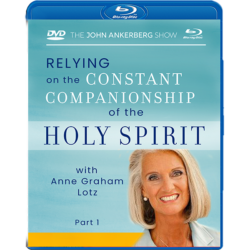A NEW SERIES FEATURING
Anne Graham Lotz
Relying on the Constant Companionship of the Holy Spirit
with Anne Graham Lotz
In Our New Series
Jesus reassured His disciples that, although He would be leaving them, He would send them "another" Comforter who would be with them thereafter. In this series, Anne Graham Lotz describes who this Comforter is, and what He does in our lives. She explains why the Holy Spirit is often referred to as the "third person" of the Trinity.
The Holy Spirit As Our
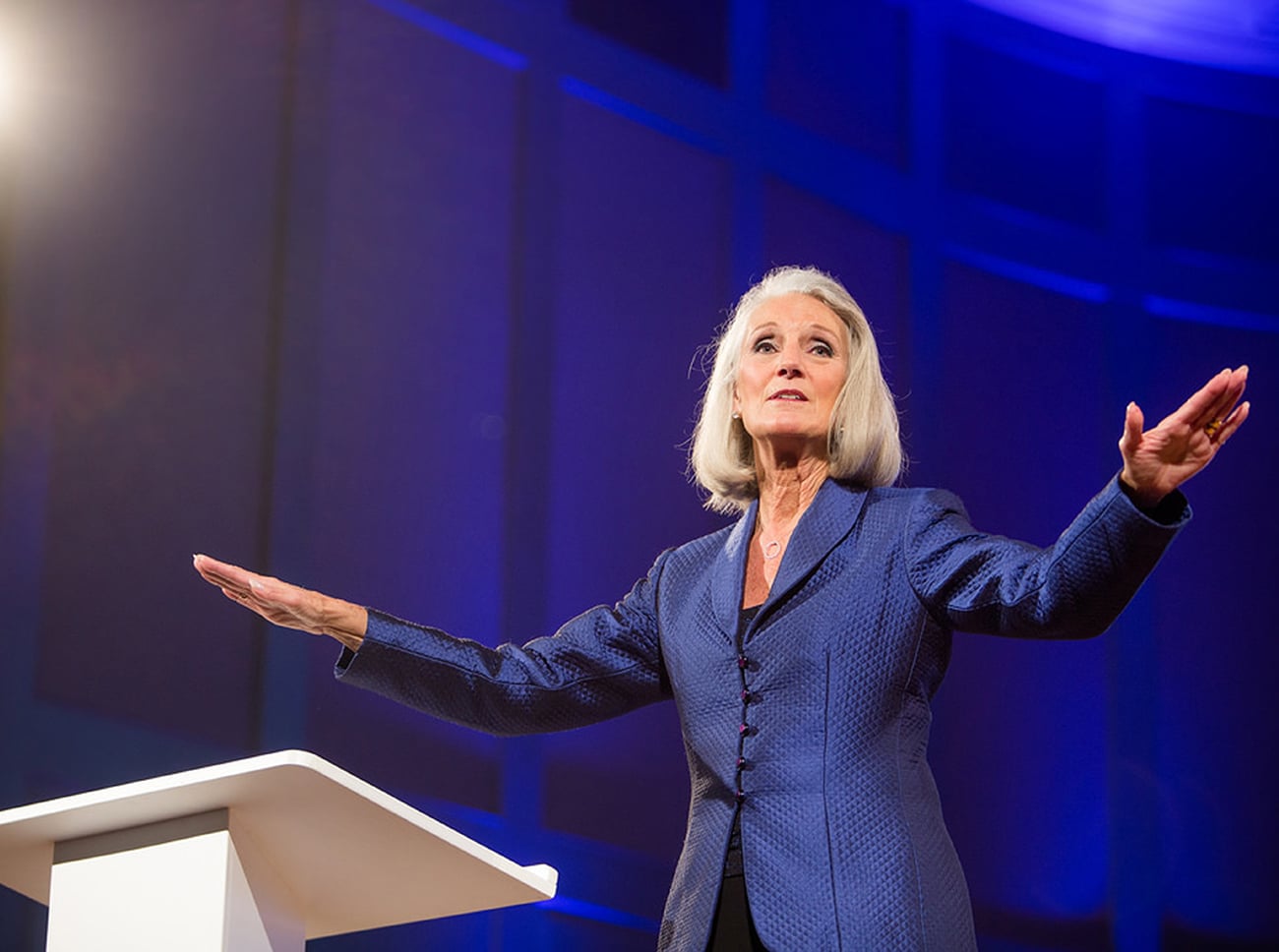
Meet Anne Graham Lotz
Called "the best preacher in the family" by her father, Billy Graham, Anne Graham Lotz speaks around the globe with the wisdom and authority of years spent studying God's Word. In all she does, Anne's aim is clear - to bring revival to the hearts of God's people. And her message is consistent - calling people into a personal relationship with God through His Word. Anne is a bestselling and award-winning author. Her most recent releases are The Light of His Presence, Jesus in Me, and The Daniel Prayer.
Anne and her late husband, Danny Lotz, have three grown children and three grandchildren. She is the founder and president of AnGeL Ministries.

Dive Deeper with our Blog Series

In Our Weakness – the Power of the Holy Spirit
Written by: Elizabeth Kloc
My ability to serve the Lord is not dependent on my capability.
There are a number of ways to phrase this, but the truth remains the same, and it can be a bit unsettling for those of us who like to be in control. My strength isn’t always needed to do God’s will, and likewise, sometimes certain things can only be accomplished through my personal weakness or inadequacy. That’s uncomfortable, isn’t it?
We see it happen over and over again in the Old Testament. Moses doubted God could use him to lead the Israelites because he wasn’t a skilled speaker. Gideon was timid and needed assurance after assurance to take that step in faith and follow the Lord’s call on his life. David was the youngest of all his brothers, and not an obvious choice to be a chosen king of Israel. These men were called to do things outside of their birthright, skillset, and comfort zone, and it was through faithfulness despite their personal weakness and inadequacy that the Lord brought glory to Himself.
I love that the Bible includes accounts of real people with real struggles and doubts. Their weaknesses not only make them more relatable, but it better highlights the work God does in and through them.
In our weakness, His work is obvious.
In the Old Testament we read about specific times God spoke to specific people and gave them special strength to accomplish things for Him. In the New Testament we have a shift, which is a game-changer for followers of Christ. Through the Holy Spirit, the third person of the Trinity, we have God constantly with us to guide and strengthen us. This is a huge gift!
After Christ died, rose again, and ascended to heaven, the believers undoubtably would have missed having the physical presence of Jesus with them. At Pentecost (Acts 2), the Holy Spirit was given to every believer, allowing them (and us) to always have the presence of the Lord with us. From then on, the Holy Spirit was and is present and active within every true believer. He is with us in a way that is unique from the other two Persons of the Trinity. When we study the role of the Holy Spirit, we see that He is someone to rely on, who guides us and gives us strength, among other things.
Ephesians 3:16-17 says, “I pray that out of his glorious riches he may strengthen you with power through his Spirit in your inner being, so that Christ may dwell in your hearts through faith.” It is through the Holy Spirit that we are strengthened, and through Him we have Christ through faith.
The Holy Spirit gives us purpose. In our series, Relying on the Constant Companionship of the Holy Spirit with Anne Graham Lotz, she says, “If we make ourselves available to Him, the Holy Spirit can fill us and use us and make our lives worth living.” A life without purpose will feel meaningless, but with the Holy Spirit’s leading, we will accomplish more for God than we ever dreamed. Who can measure the power of the Holy Spirit? When He calls us, equips us, and guides us, we are able to function from His power and not our own.
Some days we feel naturally strong, capable, competent, and enjoy functioning in our element. We feel like we can take on the world because we know what we’re doing and how to do it. But sometimes, especially if we are following God’s leading, we find ourselves in uncharted territory, trying to do things outside our normal comfort zone. It can be uncomfortable, discouraging, and scary. Surrendering to the Holy Spirit allows us to focus on Him, His leading, and working out of His strength and not ours.
In the past, I found myself “putting God in a box” and telling Him exactly what I am capable of and what I am not. I informed Him of my strengths, my preferences, and my schedule, so that He could assign me tasks that fit nicely within my parameters. As shocking as this may sound, He didn’t agree with my demands. He didn’t modify His plans for me to fit what I thought was best. And do you know what? I am so glad He didn’t!
Instead, when I came to God with my list, He kindly but firmly told me to refocus my heart and attention on loving Him. He made me seek Him more. He revealed Himself to me and made me treasure the time I spent praying, reading, and knowing Him better. And once He had my heart in the right place, He made it clear that His plans were better than mine, and that I could trust Him. Romans 15:13 says, “May the God of hope fill you with all joy and peace as you trust in him, so that you may overflow with hope by the power of the Holy Spirit.” God, through the person of the Holy Spirit, gave me an overflowing hope so that I was able to step out of my comfort zone and do the tasks He had for me.
He provides the strength. He provides the power. He provides the hope.
He asks us to be willing and to surrender.
Isn’t that a comfort? The Lord works out of HIS strength, not ours. When we are sick, when we are tired, hurting, or painfully discouraged – isn’t it a comfort that we are able to work from His strength and not our own? Just like the Old Testament narratives, in our weakness, His strength is made more obvious. To God be the glory!

Loving the Precepts of the Holy Spirit
Excerpted from Anne Graham Lotz, Jesus in Me: Experiencing the Holy Spirit as a Constant Companion, Multnomah, 2019, p. 152. Used by permission.
While my grandmother taught me how to read generally, my mother and father taught me how to read my Bible. Every day without fail, my mother led our family in devotions. She would gather everyone who was in the house into the kitchen, where she would read a portion of Scripture, then pray. I did not enjoy these times, because I always seemed to be running late for school, and it was hard to concentrate when I was trying to cram down breakfast, make sure I had my reports and schoolwork done, then get out the door to arrive at school before the bell rang. But the consistency of my mother’s effort, as well as her obvious love for God’s Word and belief in its relevancy for all of us as we began our day, made a deep impact.
When my father was home, he led family devotions, usually in the evening. He also would read a portion of Scripture, but he would then stop, ask questions, make comments, and lead us in a discussion of what he had read.
By her example my mother taught me to love and read my Bible every day—preferably in the morning. My father, by his example, taught me to think about what I was reading. Those two life lessons are perhaps the most valuable ones my parents handed down to me.

Enjoying the Presence of the Holy Spirit
“There is not in the world a kind of life more sweet and delightful
than that of a continual conversation with God.”
-Brother Lawrence, The Practice of the Presence of God, Fifth Letter
By: Jeff Pallansch
One of our greatest errors in the Christian life is that we content ourselves with too little of God.
We let going to church and living a moral life be enough. Although we sing about the greatness of God’s love, we surprisingly assign little importance to actually receiving it for ourselves and walking in its reality throughout our day. We let ourselves be satisfied with merely hearing about God and other people’s experiences of Him.
As Anne Graham Lotz puts it, we too often settle for a “secondhand relationship with God.” And yet God wants so much more for us than this!
He wants the real deal. He wants to have a personal, firsthand relationship with you. He wants you to know Him at the core of your being. He doesn’t want to stay at arm’s length. He doesn’t want you to merely experience Him vicariously through others. He wants to come and make His home with you (John 14:23). He wants to live inside of you through His Spirit so you can experience the richness of unceasing fellowship with Him throughout the day (1 Thessalonians 5:17). He wants His love to be an ever-abiding reality (John 15:9). And He has given you His Spirit for just this.
Paul writes this in Romans 5:5, “[God] has given us the Holy Spirit to fill our hearts with his love” (NLT).
And there is nothing better in this life than experiencing God’s love firsthand. Words cannot express the sweetness and joy that comes from loving communing with Him.
Have you experienced this for yourself? Do you know the “inexpressible and glorious joy” that comes from a firsthand relationship with God (1 Peter 1:8 NIV)?
One of the most amazing things is that this isn’t something we need to earn. In fact, it extends far beyond anything we could ever deserve. And yet the Bible tells us that God’s love is so vast that even “while we were still sinners, Christ died for us” (Romans 5:8). He died to pay for our sins so that we can be reconciled to God (2 Corinthians 5:18-21). And as we trust in Jesus to be our Savior, He comes to live in us through His Spirit so that we may experience His abiding presence. He takes away our heart of stone and gives a new heart of flesh—a heart that is sensitive to God’s leading and full of His love, a heart that now beats for Him (Ezekiel 36:26-27).
So, do you hunger for deeper fellowship with God through His Spirit? Have you let yourself grow content with simply going through the motions?
You will not want to miss this upcoming series with Anne Graham Lotz as she shares how you can develop a firsthand relationship with God and personally experience the Holy Spirit as your constant companion. There is nothing more enjoyable than this! Let us not be content with anything less.
“I press on to take hold of that for which Christ Jesus took hold of me.”
- Philippians 2:12 (NIV)
“In Your presence is fullness of joy;
In Your right hand there are pleasures forever.”
- Psalm 16:11 (NASB)
“I pray that out of his glorious riches he may strengthen you with power through his Spirit in your inner being, so that Christ may dwell in your hearts through faith. And I pray that you, being rooted and established in love, may have power, together with all the Lord’s holy people, to grasp how wide and long and high and deep is the love of Christ, and to know this love that surpasses knowledge—that you may be filled to the measure of all the fullness of God.”
- Ephesians 3:16-19 (NIV)

Loving the Person of the Holy Spirit
Excerpted from Anne Graham Lotz, Jesus in Me: Experiencing the Holy Spirit as a Constant Companion, Multnomah, 2019, pp. 6-9. Used by permission.
Have you ever formed ideas or opinions about someone based on what others told you? And then when you met the person for yourself, did you discover that actually he was very different from what you had been led to believe?
Recently I received an invitation to appear on a television talk show hosted by a couple who had been in the news frequently and had received quite a bit of negative publicity. Without intending to, I had absorbed some of the public’s disparaging attitude. I almost declined the invitation, but when some respected advisers urged me to accept it, I did. What I discovered was almost the polar opposite of what I had been led to believe.
The couple was humble, warm, charming, thoughtful, encouraging, and supportive. They were easy to talk with, and I found my spirit resonating with theirs. To this day, I’m struck by the contrast between the public’s perception of them, as well as my own preconceived opinions, and the reality of their lovely personalities and authentic testimonies.
While our perception of other people can be dramatically different from reality, the same may also be said about our perception of the Holy Spirit. Could your perception be different from the truth or even in sharp contrast to it?
I’ve heard the Holy Spirit spoken of as an “it,” a feeling, a dove, a flame, a ghost, an emotion, or even an ecstatic experience. He is frequently referred to as the third person of the Trinity, as though He is the least of the Trinity or a postscript to the more significant Father and Son. All of which is inaccurate.
While the Holy Spirit may be symbolized by a dove or flame, while His presence may be accompanied by an emotion or feeling or ecstatic experience, He Himself is distinctly separate from those things. The Holy Spirit is not a thing but a person. His personhood is emphasized in John 16, when eleven times in eight verses, He is referred to by the personal, masculine pronouns He, Him, and His.[1]
So at the outset of our exploration of who the Holy Spirit is, we need to be clear that we are not speaking of an “it.” We are speaking of a “He.” He is a living person who has a mind, a will, and emotions. He is referred to as the third person of the Trinity not because He is the least but because He is the third person to be more fully revealed in Scripture.
In the Old Testament, although the Holy Spirit and God the Son—the living Word who became Jesus in the flesh—are present, it is God the Father who is primarily revealed. In the Gospels, while the Father and the Holy Spirit are certainly present, it is God the Son who is primarily revealed. Beginning with Acts and the epistles, although God the Father and God the Son are also present, it is primarily God the Holy Spirit who is revealed. In fact, the book of Acts is not about the acts of the disciples or the early church. It is a book about the acts of the Holy Spirit as He worked in and through the disciples and the early church.
If the Holy Spirit is a person with an intellect, will, and emotions, what is He really like? What is His personality? What are His responsibilities? Are you intrigued by this mysterious person? I know I have been and still am. One way we get to know Him is through His names.
In the Bible, names reveal the character of the person to whom they are given. For example, in the Old Testament, Abraham’s grandson was given the name of Jacob, which means “deceiver” or “supplanter.” Jacob grew up to be a man who deceived his father, Isaac. In doing so, Jacob supplanted his brother, Esau, as the heir to his father’s blessing. He was well named.
Twenty years after that deception, when Jacob returned to claim his inheritance, he was blocked from doing so by the angel of the Lord, who was a visible, tangible manifestation of the Lord Himself. After an entire night of struggling, God dislocated Jacob’s hip to force him to give in and give up. But instead of falling to the ground in a heap of self-pity, Jacob wound his arms around God’s neck and said he would not let go until God blessed him. Right there, on the edge of the river that served as the border to the Promised Land . . . the river where they had been wrestling, God led Jacob to confess his name . . . who he was . . . the deceiver and supplanter. Then God changed Jacob’s name to Israel, which means “a prince who has power with God.” As a man broken, Jacob fully yielded his life to God, and he did indeed become a prince with power, the father of twelve sons who became the founding fathers of the nation that bears his name—Israel.[2]
Perhaps the most familiar example of how a name reveals someone’s character is found in the name given to the Son of God. He was called Jesus, which means “Savior,” “Rescuer,” “Redeemer,” “Deliverer”—the One who would save us from the penalty and power of sin.[3] His name accurately describes who He was . . . and who He is.
So what about the Holy Spirit? In John 16:7 Jesus gave Him a name that is often rendered “Helper” in English but is a rich word that requires several English words to effectively capture its meaning. The Amplified Bible version of the same verse indicates that the word for “Helper” could also be rendered as follows: “I tell you the truth, it is to your advantage that I go away; for if I do not go away, the Helper (Comforter, Advocate, Intercessor—Counselor, Strengthener, Standby) will not come to you; but if I go, I will send Him (the Holy Spirit) to you [to be in close fellowship with you].” In the following seven chapters, we’ll consider together the personal and practical implications of each aspect of the Holy Spirit’s name as listed in the Amplified Bible version of John 16:7.
One of my deepest, richest joys has been discovering by experience who the Holy Spirit is in every step of my life’s journey. Each name that He has been given—Helper, Comforter, Advocate, Intercessor, Counselor, Strengthener, and Standby—reveals another aspect of His beautiful character and has provoked in me a deep love for the One who is my constant companion . . . Jesus in me. My prayer for this book is that you, too, will discover Him by personal experience as your constant companion and that the discovery will lead you to love and rely on Him more.
[1] John 16:7-14. The number of pronouns used for the Holy Spirit occurs in the 1978 version of the New International Version of the Bible. This number may vary according to different translations.
[2] The dramatic story of Jacob’s name change is found in Genesis 32.
[3] Matthew 1:21.

Sacred Wounds
By: Pastor Carey Dean
Wounds
These are things we avoid. They result from pain and often leave a lasting marked reminder of an undesired moment. The wounds being referred to are not self-inflicted wounds, but rather wounds from an outside source, specifically from within the church itself. Physical wounds break the surface; emotional wounds go deep into the soul; but the deepest of all are wounds of the spirit. The spiritually wounded are all around us.
As a pastor, I have a unique view of God’s glorious working, as well as man’s fleshly striving. Flesh has no respecter of person or position. Its beckoning to achieve self-preservation and personal agenda reaches from the pulpit to the pew. It is sadly ironic how what should be the safest place (the church) can become a personal battlefield. The church is God’s good design for a lived-out devotion to His Word, one another, Christ’s accomplished work, and prayer among His people (Acts 2:42). The church is God’s good design created to breathe and live as the body of Christ, His hands, feet, and mouthpiece to a lost and dying world. This design is for God’s glory, our good, and the world’s knowing of Jesus.
But the church is made of people like you and me, who are frail and always capable of a return to the old, fleshly acts of man. Our flesh is devoted to something wholly different than the devotion of the revived spirit. The flesh’s devotion is to the unholy trinity of me, myself, and I. The church gathered is the most likely place for spiritual wounds because it is where spirit’s devotion is challenged by flesh’s devotion in each of us every time we enter the intended holy space.
When the wound occurs
The hardest wounds to bear are the ones that come unexpectedly. The deepest wounds are those occurring inside once trusted relationships. When we are wounded, we respond in one of three ways: fight back with our flesh; run away in our flesh; or count it all joy in our spirit.
For me, ministry has involved more wounds than I can count. Each wound has a date-stamp that has healed, but the scar remains. The wounds have come from both fellow pastors and church members alike. In the first years of ministry, my response to being wounded was patterned by running away in my flesh as a victim. I wanted to get as far away as possible from the pain and hide inside the deepest cave I could create.
My running ended one day inside the cave called depression. In that cave I realized I could run no more. Jesus met me in that cave and invited me to see wounds in a completely different way… with joy. In that cave, He taught me how my flesh wants to run and hide. We walked out of that cave together. To see clearly my flesh’s natural response of being hurt was an important revelation. He not only showed me flesh’s response, but also showed me the impossible response found only in Christ. He invited me to press into Himself with complete dependence instead of running away from man.
The choice of pressing into Christ birthed a joy in the pain that could only be the fruit of His Spirit in me. Commands that shook my foundations were found in verses like Romans 5:3, “rejoice in suffering” and the very familiar, but rarely experienced, James 1:2, “count it all joy, my brothers, when you meet trials of various kinds.”
How hope is known
The Lord is so kind to make our walk with Him a journey. Each step by faith is an important one. He desires one thing for us: to know Him. Wounds offer us an invitation to walk with Jesus through the pain. He wants to be the One who defines the wound and authors our response to the one who has wounded us. Jesus will open our eyes to how we were guilty of inflicting the greatest of wounds upon Him and were met with only His grace and mercy. To the extent we embrace the receiving of grace from Jesus Himself we will have the capacity to extend the same to those causing our wounds.
The verses mentioned previously (Romans 5:3 and James 1:2) have a common word that immediately follows the seemingly impossible commands. The word is “know.” Jesus came so that we would know Him. Jesus Himself declared in John 17:3, “And this is eternal life, that they know you, the only true God, and Jesus Christ whom you have sent.” So we must believe that even the wounds, especially the wounds, become a way of knowing something good, wonderful, and marvelous about the life of Christ alive in us.
Be encouraged, my wounded friend, in the knowing of Christ and His good design for your life in Him. Hear what both Paul and James tell us to expect to know as we rejoice in the wounds: Paul (suffering produces endurance—produces character—produces hope); James (trials produce steadfastness—produces a full effect of completion, lacking in nothing). And the Word tells that hope never disappoints.
When wounds become sacred
The very wounds I cried out for removal have now become my treasured scars. They are the places where I remember not what man did to me, but instead who Jesus became to me: Healer, Prince of Peace, Wonderful Counselor, and Friend. The wounds are my testimony of His grace toward me and have become a reminder to extend grace to those around me.
Many allow a wound to be the reason for leaving the physical church. Sometimes that is necessary when ungodly spiritual abuse prevails, but most often that is not the case. The church is not made of brick and mortar, but it is a place. It is a place of gathered believers built to live and breathe as the body of Christ… learning to love, extend grace and forgive “one-another” as Christ has loved us, and be a living testimony of how the impossible is possible in Christ of counting it all joy in every trial.
Carey Dean serves as Executive Pastor at First Baptist Church, Merritt Island, Florida.

The Holiness of the Holy Spirit
By: R.L. Wilson
In our programs with Anne Graham Lotz, she mentioned a seminary professor who confessed to being unaware that the Holy Spirit is, in fact, holy. While that may seem amazing to us, I am going to propose two possible reasons why we might be tempted to ignore or overlook the holiness of the Holy Spirit.
The first is that we tend not to think of the Holy Spirit as God. Anne herself mentioned that He is referred to as the “Third Person” of the Trinity, perhaps implying for some that He is less important. No, Anne explains, He is rather the third revealed—God the Father in the Old Testament, God the Son in the Gospels, followed by God the Holy Spirit revealed by Jesus, and most fully experienced after Jesus returned to heaven.
If you look for a verse that says, “the Holy Spirit is God,” you may be disappointed. However, one classic event offered as proof of His deity is the story of Ananias and Sapphira in Acts 5. Early Christians often sold property and gave the money to the church meet the needs of others. When Ananias held back a portion of the money he had received from a sale, but deceitfully indicated that he was giving the entire amount, Peter confronted him, saying, “you have lied to God” (Acts 5:3). Three hours later, Sapphira made the same claim, and Peter accused her of conspiring to “test the Spirit of the Lord” (v. 9).
But I think there’s a deeper reason why we—okay, why I—tend to ignore the Holy Spirit’s holiness. It is simply that we are very uncomfortable with the whole concept of holiness.
We are very aware of our own unholiness, our own sinfulness. We are also very aware of God’s standard for us—“be holy because I am holy” (1 Peter 1:16). We recognize our own inability to meet God’s standard, and fail to recognize that we are not expected to do so in our own strength. As Wayne Barber was fond of saying, “I can’t, God never said I could. God can, He always said He would.”
“It is God who is working in you, enabling you both to desire and to work out His good purpose” (Philippians 2:13). What is that purpose? It is to be conformed to the image of Jesus (Romans 8:29).
God promised, “I will put My Spirit within you and cause you to walk in My statutes, and you will be careful to observe My ordinances” (Ezekiel 36:27). He promised, “when He, the Spirit of truth, comes, he will guide you into all the truth;…” (John 16:13).
The holiness of the Holy Spirit is not something to fear. Instead, we have the promise from God that “the Spirit of God dwells in us” (1 Corinthians 3:16) and that “we are the temple of the living God; just as God said, ‘I will dwell in them and walk among them; and I will be their God, and they shall be My people’” (2 Corinthians 6:16).
As we allow the Holy Spirit to work in us, we learn what it takes to be “holy in all [we] do” (1 Peter 1:15).

God’s Grandchild?
By: R.L. Wilson
During our time with Anne Graham Lotz, she made a comment that sparked a memory of a defining moment in my own faith journey. She said, “God doesn’t have any grandchildren. You know, just because I’m Billy Graham’s daughter doesn’t mean I’m a child of God. I had to make that decision for myself.”
I can relate to that.
I grew up on the mission field. We had family devotions frequently—can’t say I remember it being every night, but certainly several times a week. I am told that I was about 4 or 5 when I asked Jesus to come into my heart, although I don’t have a clear memory of that.
We had Bible classes in school. We all took part in a Bible memory program where we earned badges and prizes for memorizing verses. By the time I was in 7th grade, I was teaching a Bible class at a nearby school, had a leadership role in Pioneer Girls, and made straight A’s in Bible classes all through high school.
But imagine trying to rebel when every adult around you, including all your teachers, were missionaries who felt compelled to conform you to a pretty rigid standard of behavior and belief. Outwardly, I could totally identify with Paul. I was, to all outward appearances, “as for righteousness based on the law, faultless” (Philippians 3:6).
But then I graduated high school, and came to the United States for college. I had fully intended to rebel against my very religious upbringing, changing my name to one not so “biblical,” and finally getting a chance to “live a little.”
But several things happened: First, I was on my first solo airplane flight on the way to Atlanta. The pilot came on the intercom inviting us to see a rather unusual sight. There, on the clouds, was a shadow of the plane, completely encircled by a rainbow. He called it a pilot’s halo. As I looked at that rainbow, God brought to my mind a verse I had memorized years before, “The eternal God is your refuge, and underneath are the everlasting arms” (Deuteronomy 33:27). The first domino fell as I recognized I would not be getting away from God’s presence. In fact, He was promising to be with me.
When I got to school, the first thing the instructors told us was that they didn’t care what we wanted to be called, we would be known by the first name on our birth certificates—I was stuck with my biblical name! There went domino number 2.
Even worse, we’ll call them dominoes 3 and 4, among my instructors were twin sisters, former nuns, who had been missionaries in Africa. They took upon themselves the task of keeping me in line! YIKES!!!! Okay, fine. I would just continue to be the “good” missionary kid (a contradiction in terms, as we generally consider ourselves even worse than preacher’s kids!)
All that is a long lead up to what happened one Sunday a few months later. I was visiting a church with a friend. We had gone to a Sunday School class, where my friend introduced me. The teacher welcomed me, then asked, “Are you a Christian?” My immediate response? “Oh, yes. My parents are missionaries.”
Can you say brick wall?! As I heard those words echoing in my mind, I realized that I had some serious work to do. Did I truly believe I was saved simply because I was a missionary kid? Was I counting on my parents’ religion to get me to heaven? Was I truly a child of God?
Over the next few weeks and months, I had to do some serious thinking, praying, and reading my Bible. In the end, I was able to say with confidence that my faith was my own. I truly believed that Jesus died for me. I truly had asked for and received the salvation He offered me. I truly did have a lifelong commission to become “conformed to the image of His Son” (Romans 8:29).
Even as I thought about those circumstances I have related here—the pilot’s halo, the name edict, even the nuns, I could see how God was encircling me and protecting me, even from myself. I can echo Anne’s words, “He placed the Holy Spirit within me. It’s been a process. It’s a journey as a Holy Spirit has worked in my life. And his primary aim is not so much to clean me up, but to conform to the image of Jesus to make me like Jesus.”
So, not a grandchild, but a daughter of the King!
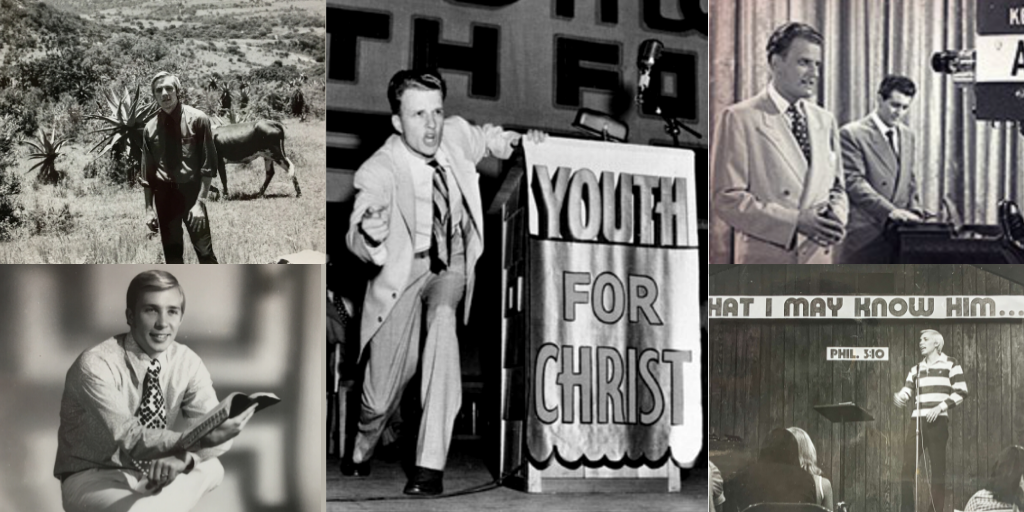
John Ankerberg’s Connection with Billy Graham
By: Jeff Pallansch
It was over a game of softball at a summer picnic in Wheaton, Illinois, that John first remembers meeting Billy Graham. Although John was quite young at the time, he was fast and had a natural talent for baseball. Because a few of the other guys knew this, they had him cover left-field.
Billy also liked baseball, and it was not long into the game that Billy went up to bat.[1] Seeing the small kid out there in left field, Billy thought he would make the most of the opportunity. Sure enough, he nailed it. It was a hit worthy of a homerun. But to his surprise, John got it and quickly flipped it in. Billy Graham was out. Everyone there got quite a kick out of it. This was the first time John and Billy really met, and it was something neither Billy nor John ever forgot.
This pickup game of softball came about because John’s father, Floyd Ankerberg,[2] and Billy Graham were both founding board members for the ministry Youth for Christ (YFC). As YFC expanded, Floyd served as the Eastern Regional Director and then worked to bring YFC to the Scandinavian countries. It was over these early YFC staff picnics and softball games that John developed a relationship with Billy Graham.
However, it was not until a year or two later, when John was 11, that he realized the scope of what these early YFC leaders did. Up until then, they were just a group of his dad’s ministry friends he played ball with. But all this changed when his dad took him out east to attend an event at Madison Square Garden. It was Billy Graham’s 1957 crusade.[3]
John remembers weaving through the basement corridors with big pipes hanging overhead as they made their way to a greenroom. When he got there, he was concerned to see Billy Graham being escorted by four large police officers. “What did Billy do?”, he asked. He thought Billy was in trouble. His dad explained that Billy didn’t do anything wrong. The officers were there to protect him.
As the time drew near for the event to begin, John’s dad brought him up to the stadium. But since Floyd needed to accompany the group onstage, He told John not to leave his seat on the main floor until he could come back and get him. John remembers sitting there alone watching people as they piled into what was once an empty arena. It wasn’t long until the stadium was packed. Energy and excitement filled the stands as the choir sang and Billy got up to preach. At the end of his talk, Billy invited anyone who wanted to receive Jesus as their Savior to come forward. John remembers everyone around him suddenly standing up and going to the front. He was the only one who remained seated in his section. He saw then firsthand that God was doing something unique.
As John grew older, he started traveling internationally with his dad doing evangelistic crusades. He recalls how they always made a point of meeting up with Billy or other YFC directors when they happened to be near each other overseas.
On one of these international trips, John and his dad were in Rio de Janeiro working with a Brazilian pastor named Nilson Fanini. Fanini was a great evangelist, sometimes referred to as “the Billy Graham of Brazil.”[4] At that time they were helping him prepare for a large evangelistic crusade at the main soccer stadium in Rio. To their surprise, a television station heard of it and offered Fanini an opportunity to air it throughout Brazil. He just had to come up with the funds to cover the airtime.
He called all the Christian businessmen he knew, but none were able to help him at that time. As they struggled to come up with the money, John thought of Billy Graham. Now, Fanini was also friends with Billy and served as one of his interpreters during Graham’s crusades in Rio.[5] So, John gave Billy a call, and by God’s providence, he happened to be home. Billy picked up the phone and recognized John. After a brief conversation, John handed the phone over to Fanini.
When Fanini shared about the opportunity, Billy was eager to help. However, he needed his board’s approval in order to give money away – they knew Billy would too easily give all of it away if he could. The next day Billy gathered his board, they approved the request, and he sent the money. For one of the first times, the gospel message was broadcast throughout Brazil on TV.
Over the years, Billy Graham played a formative role in John’s life. From dusty softball games in Wheaton to massive evangelistic events on the other side of the globe, John always found Billy to be the real deal. He was a Spirit-filled man who truly loved and walked with God. His humility, devotion to prayer, and love for reading God’s Word throughout the day will forever stick with John. He is so grateful to have grown up around the evangelistic movement God birthed through YFC.
[1] https://billygrahamlibrary.org/billy-graham-and-baseball/
[2] https://www.chicagotribune.com/news/ct-xpm-1996-08-17-9608170149-story.html
[3] This crusade ended up lasting 16 weeks. 2,397,400 persons attended the meetings and 61,148 made decisions for Christ.
https://billygrahamlibrary.org/1957-new-york-crusade/
Here are a few recordings of it:
https://www.youtube.com/watch?v=3gHB8ta1lRU
https://www.youtube.com/watch?v=7lyjUa5obmU
https://www.youtube.com/watch?v=ei_eIL08vbs
https://www.youtube.com/watch?v=g-ZQ_dEdlPE
[4] https://www.baptistpress.com/resource-library/news/brazilian-nilson-fanini-dies-at-77/

Based on Her Bestselling Book
The internationally recognized Bible teacher and daughter of Billy Graham combines unique biblical insights and her own personal stories to show how the Holy Spirit guides us in our decisions, comforts us in pain, and stays by our side at all times, enriching our daily lives.
As Anne writes, "One of my deepest, richest joys has been discovering by experience who the Holy Spirit is in every step of my life's journey. Each name that He has been given-Helper, Comforter, Advocate, Intercessor, Counselor, Strengthener, and Standby-reveals another aspect of His beautiful character and has provoked in me a deep love for the One who is my constant Companion . . . Jesus in me."
Watch the Program
03 | Enjoying the Presence of the Holy Spirit
The presence of the Holy Spirit. What does that mean? Where did the Holy Spirit come from? Where is He present? When is He present? How is He present. What difference does His presence make? You will learn the answers to these and many other questions on this week's episode.
04 | Relying on the Power of the Holy Spirit
Have you been hurt by other Christians? As Anne Graham Lotz explained, "there is no limit to His power." In this week's episode she will explain how you can rely on the power of the Holy Spirit to help overcome the hurt and continue in your Christian life.
05 | Living by the Precepts of the Holy Spirit
The Bible is where we learn what God has revealed to us about Himself and about what He expects of us as His children. What is your opinion of the Bible? Anne Graham Lotz will explain what she learned about the Bible from her grandmother, mother, and father in this week's episode.
06 | Reflecting the Purity of the Holy Spirit
What role does the Holy Spirit who is Himself holy play in conforming us to the holiness of Jesus? What does God mean when He says "be holy as I am holy"? What does the Holy Spirit have to do with that process of becoming holy? Anne Graham Lotz will explain in this week's episode.





